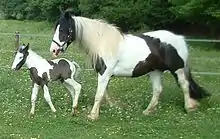colt
See also: Colt and colț
English

A mare and colt.
Etymology
From Middle English colt, from Old English colt, from Proto-Germanic *kultaz (“plump; stump; thick shape, bulb”), from Proto-Indo-European *gelt- (“something round, pregnant belly, child in the womb”), from *gel- (“to ball up, amass”). Cognate with Faroese koltur (“colt, foal”) Norwegian kult (“treestump”), Swedish kult (“young boar, boy, lad”). Related to child.
Pronunciation
- (UK) IPA(key): /kəʊlt/, [kɔʊlt], (also) /kɒlt/
- (US) IPA(key): /koʊlt/
Audio (US) (file) - Rhymes: -əʊlt
Noun
colt (plural colts)
- A young male horse.
- Coordinate term: filly
- A young crane (bird).
- (figuratively) A youthful or inexperienced person; a novice.
- c. 1596–1598 (date written), William Shakespeare, “The Merchant of Venice”, in Mr. William Shakespeares Comedies, Histories, & Tragedies […] (First Folio), London: […] Isaac Iaggard, and Ed[ward] Blount, published 1623, OCLC 606515358, [Act I, scene ii], line 38:
- Ay, that's a colt indeed, for he doth nothing but / talk of his horse, and he makes it a great appropriation to / his own good parts that he can shoe him himself.
- (cricket, slang) A professional cricketer during his first season.
- 1882, The Downside Review (volume 1, page 287)
- The bowling is more promising in the colts than in the eleven.
- 1882, The Downside Review (volume 1, page 287)
-
- (nautical) A short piece of rope once used by petty officers as an instrument of punishment.
- (biblical) A young camel or donkey.
Derived terms
- colt evil
- colt's tooth
- summer colt
- woods colt
Translations
young male horse
|
novice
|
rope
|
Verb
colt (third-person singular simple present colts, present participle colting, simple past and past participle colted)
- (obsolete, transitive) To horse; to get with young.
- 1611 April (first recorded performance), William Shakespeare, “The Tragedie of Cymbeline”, in Mr. William Shakespeares Comedies, Histories, & Tragedies […] (First Folio), London: […] Isaac Iaggard, and Ed[ward] Blount, published 1623, OCLC 606515358, [Act II, scene iv], line 133:
- Never talk on't: / She hath been colted by him.
-
- (obsolete, transitive) To befool.
- c. 1597 (date written), William Shakespeare, “The First Part of Henry the Fourth, […]”, in Mr. William Shakespeares Comedies, Histories, & Tragedies […] (First Folio), London: […] Isaac Iaggard, and Ed[ward] Blount, published 1623, OCLC 606515358, [Act II, scene ii], line 36:
- What a plague mean ye to colt me thus?
-
- To frisk or frolic like a colt; to act licentiously or wantonly.
- 1596 (date written; published 1633), Edmund Spenser, A Vewe of the Present State of Irelande […], Dublin: […] Societie of Stationers, […], OCLC 606546850; republished as A View of the State of Ireland […] (Ancient Irish Histories), Dublin: […] Society of Stationers, […] Hibernia Press, […] [b]y John Morrison, 1809, OCLC 22906028:
- They shook off their bridles and began to colt.
-
Synonyms
- (to act licentiously or wantonly): See Thesaurus:harlotize
See also
- stallion, mare, foal, filly, horseling
References
- colt in Webster’s Revised Unabridged Dictionary, G. & C. Merriam, 1913
Further reading
 colt on Wikipedia.Wikipedia
colt on Wikipedia.Wikipedia
Anagrams
- TLOC, clot
French
Noun
colt m (plural colts)
- Colt (gun)
Further reading
- “colt”, in Trésor de la langue française informatisé [Digitized Treasury of the French Language], 2012.
Middle English
Alternative forms
- colte, cowlt
Etymology
From Old English colt, from Proto-Germanic *kultaz.
Pronunciation
- IPA(key): /kɔlt/, /kɔːlt/
Noun
colt (plural coltes)
- A juvenile equid or camel; a colt.
- (derogatory, rare) A human child.
Descendants
- English: colt
- Scots: colt, cout, cowt
- Yola: caule, caul, cawl, kawle
References
- “colt, n.”, in MED Online, Ann Arbor, Mich.: University of Michigan, 2007, retrieved 2018-08-12.